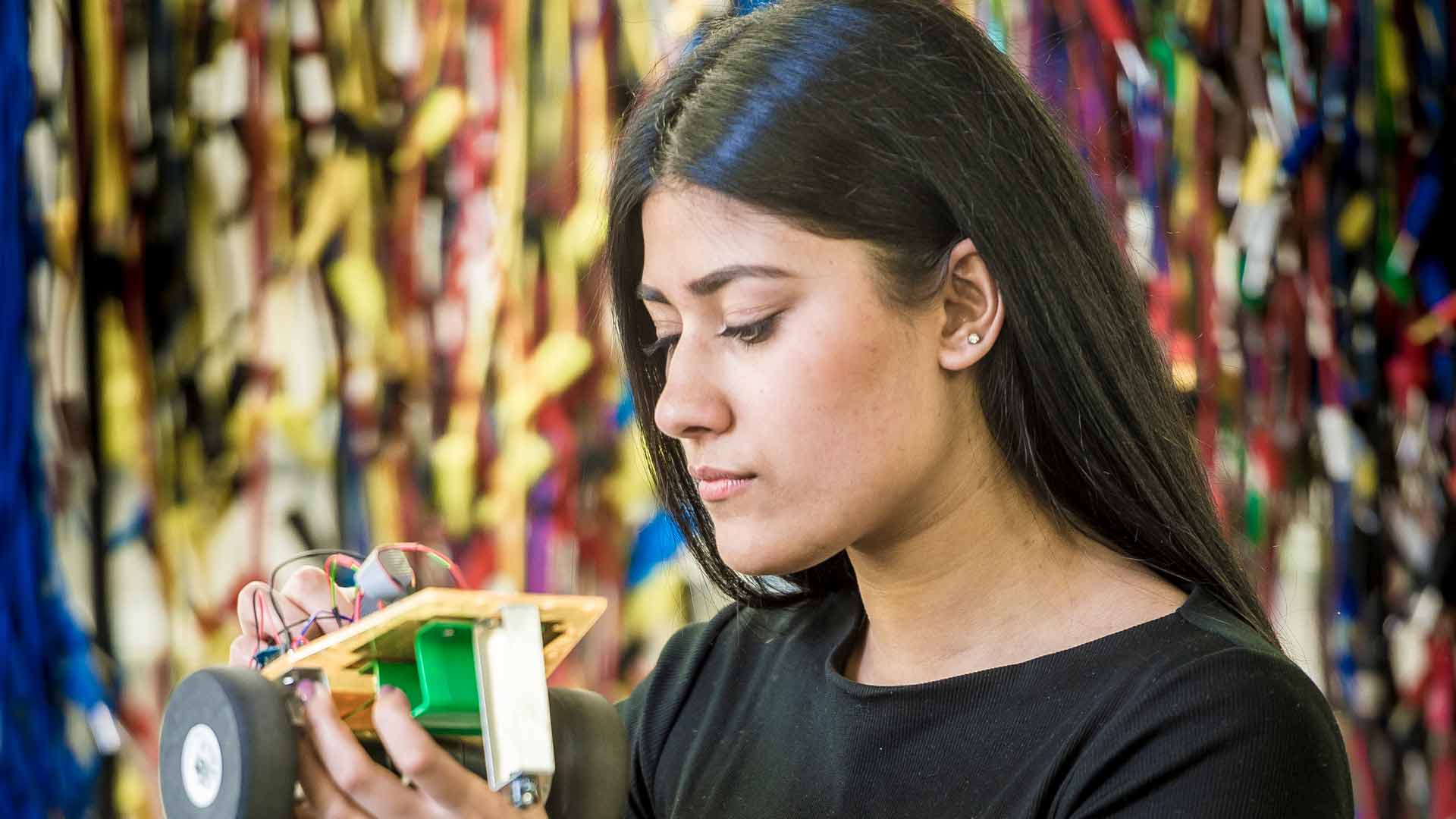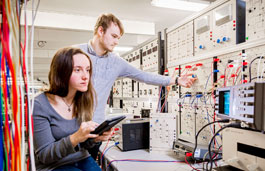Search
Electrical and Electronic Engineering MSc
Study level: Postgraduate
This course prepares you for a variety of roles in the electrical and electronic industry, such as software engineer, control systems engineer, or electrical and electronic engineer in the automotive sector.
Year of entry
Location
Coventry University (Coventry)
Study mode
Full-time
With Professional Placement
Duration
1 year full-time
Up to 2 years full-time with professional placement
Course code
EEST003
Start date
January 2026
March 2026
May 2026
July 2026
Course overview
Electrical and electronic engineering (EEE) is integral to every aspect of contemporary life, as it underpins much of the modern technology and infrastructure.
Carbon neutrality, renewable energy and smart grids, the fourth industrial revolution, the internet of things (IoT) and industrial internet of things (IIoT), and the electric revolution are driving forces behind today’s technology. Electrical and electronic engineers are essential to powering these advancements.
Key course content includes:
- modelling, design and analysis of electrical machines and drives, and power electronics
- design and analysis of power systems and smart grids and study of renewable energy sources
- advanced control methodologies and signal processing
- microcontroller programming and field programmable gate arrays-based system design.
5 QS Stars for Teaching and Facilities
QS Stars University RatingsRanked 9th Modern University in UK by the Times
The Times and Sunday Times Good University Guide 2025Ranked 4th for Overall Satisfaction in PTES
Postgraduate Taught Experience Survey (PTES) 2025Why you should study this course
- Course content covers a significant body of science relevant to the subject area to develop your analytic and critical thinking.
- Apply your theoretical knowledge to practical problems drawing from real-world data and problems.
- Get hands-on experience with experimental set-ups and contemporary software tools relevant to the electrical and electronic engineering profession.4
- You’ll cover a range of management, social, legal and professional topics relevant to engineering and its application in the real world.
- Gain practical experience and boost your CV with an additional professional placement. See the modules for more details.2
What it’s like to study Electrical and Electronic Engineering MSc
The most enjoyable thing about the course was getting hands-on experience and training working with electronic equipment such as oscilloscopes, multi-meters and soldering equipment.
Read more
What you'll study
Course content focuses on electrical systems such as renewable energy, smart grids, and electrical machines and drives. It provides advanced knowledge on contemporary microcontrollers and field programmable gate arrays (FPGA)-based system design, digital communications, advanced control engineering and signal processing.
We regularly review our course content, to make it relevant and current for the benefit of our students. For these reasons, course modules may be updated.
How you'll learn
Teaching and learning methods may include:
- lectures
- seminars
- tutorials
- presentations
- group projects
- workshops
- practical laboratory sessions.
Teaching contact hours
As a full-time postgraduate student, you will study modules totalling 180 credits each academic year. A typical 30-credit module requires a total of 300 hours of study. Study hours are made up of teaching contact hours, and guided and independent study.
Teaching hours
Teaching hours may vary, depending on where you are in your studies, but on average you will have between 8 and 12 teaching and learning hours each week. You will also have the opportunity to attend optional sessions including time with a Success Coach or to meet with staff for advice and feedback.
Guided and independent study
Throughout your studies, you will be expected to spend time in guided and independent study to make up the required study hours per module. You will be digging deeper into topics, reviewing what you’ve learnt and completing assignments. This can be completed around your personal commitments. As you progress to the end of your studies, you’ll spend more time on independent learning.
Online learning
As an innovative university, we use different teaching methods, including online tools and emerging technologies. So, some of your teaching hours and assessments may be delivered online.
Assessment
This course will be assessed using a variety of methods which could vary depending on the module. Assessment methods may include:
- reports
- tests
- essays
- exams
- practical coursework
- assignments
- viva
- presentations.
The Coventry University assessment strategy aims to ensure that our courses are fairly assessed and allows us to monitor student progression towards achieving the intended learning outcomes.
Entry requirements
Typical entry requirements:
Fees and funding
| Student | Full-time | Part-time |
|---|---|---|
| UK, Ireland*, Channel Islands or Isle of Man | £11,200 £1,500 professional placement fee (if placement secured) |
Not available |
| EU | £11,200 per year with EU Support Bursary** £1,500 professional placement fee (if placement secured) per year with EU Support Bursary** £18,600 per year without EU Support Bursary** £1,800 professional placement fee (if placement secured) per year without EU Support Bursary** |
Not available |
| International | £18,600 £1,800 professional placement fee (if placement secured) |
Not available |
For advice and guidance on tuition fees3 and student loans visit our Postgraduate Finance page and see the university's Tuition Fee and Refund Terms and Conditions.
We offer a range of International scholarships to students all over the world. For more information, visit our International Scholarships page.
Tuition fees cover the cost of your teaching, assessments, facilities and support services. There may be additional costs not covered by this fee such as accommodation and living costs, recommended reading books, stationery, printing and re-assessments should you need them.
The following are additional costs not included in the tuition fees:
- Any optional overseas field trips or visits: £400+ per trip.
- Any costs associated with securing, attending or completing a placement (whether in the UK or abroad).
*Irish student fees
The rights of Irish residents to study in the UK are preserved under the Common Travel Area arrangement. If you are an Irish student and meet the residency criteria, you can study in England, pay the same level of tuition fees as English students and utilise the Tuition Fee Loan.
**EU Support Bursary
Following the UK's exit from the European Union, we are offering financial support to all eligible EU students who wish to study an undergraduate or a postgraduate degree with us full-time. This bursary will be used to offset the cost of your tuition fees to bring them in line with that of UK students. Students studying a degree with a foundation year with us are not eligible for the bursary.
Facilities
- Electronics Laboratories: there are three electronics labs with industry-standard equipment from brands in the field such as Tektronix and Keithley. They include bench power supplies, multi-meters, signal generators and oscilloscopes. One of these labs contains a large variety of old and new bench equipment allowing you to get experience in a multitude of test and measurement equipment.
- Prototyping and manufacturing capabilities: a dedicated prototyping facility used for soldering and desoldering, equipped with a CNC machine used for manufacturing simple printed circuit boards. There is also a reflow oven for automated soldering of surface mount components on simple boards. All the facilities are well stocked with all the relevant development boards (including our own university development platform – ePIC board) such as STM32, ESP32, Raspberry Pi, Arduino, PIC boards and a large variety of smaller addon boards used for developing and testing all manner of different embedded, IoT systems and robotics systems (sensors, drivers, communications, input/output, displays modules).
- Printing: there are seven 3D printers, three of them are for polylactic acid (PLA) printing, two are more advanced and can use a multitude of materials, and the last two are resin printers for high-resolution printing. Objects can be printed for your projects at any stage in your studies. Each of the laboratories has fully equipped soldering station or a re-workstation available, including fume extractors magnifiers and microscopes for more precise work.
- In-house development board for embedded systems: to support activity-led learning, you will have access to the experimental peripheral interface controller (ePIC ) board, developed by the electronics team of Coventry University. The board provides flexibility in using different microcontrollers with other peripherals such as motors, sensors and LDC screens.
- Electrical Laboratory: equipped with industry-standard high voltage equipment allowing experimentation on topics related to power generation and regulation, motor control and motor investigations of behaviours under load.
- Physics and Robotics Laboratory: facility for testing of robotics prototypes. There are several platforms in use for postgraduate projects.

Lanchester Library
The library is usually open 364 days a year. It’s where you can access your course’s specialist Academic Liaison Librarian. It’s also home to specialist teams which can support you with your academic writing and maths and statistics questions.

The Hub
The Hub is the centre of student life on campus. Facilities include a food court, convenience store, multi-faith centre, medical centre, hairdresser, coffee shops and the Your SU offices. It has fully licensed function spaces and a bar.

Careers and employability
Get one-on-one guidance lasting up to 18 months from the end of your course. We’ll help you find placements and graduate roles, offer CV and application checks, mentoring, skills workshops, employer events and more.
Facilities are subject to availability. Access to some facilities (including some teaching and learning spaces) may vary from those advertised and/or may have reduced availability or restrictions where the university is following public authority guidance, decisions or orders.
Careers and opportunities
The specialist topics studied in the programme aim to prepare you for a range of roles in various industries. These industries include electrical power generation and distribution (including renewables), transportation and industrial equipment manufacturing (especially with electrical drives), industrial measurement and monitoring systems, and robotics. The growing demand for electric vehicles is also creating new opportunities in this field.
On successful completion, you will have knowledge of:
- advanced principles of electrical and electronic engineering and their relationships to leading-edge, real-world applications
- advanced analysis and design tools and processes
- the implementation and critical evaluation of design solutions relevant to the subject areas through simulation and practical applications.
On successful completion you should be able to:
- critically appraise the main approaches to research design, sampling and analysis appropriate to engineering and construct research questions or hypotheses
- conceptualise complex technical aspects of electrical and electronic engineering
- conduct detailed and systematic technical analyses of aspects of electrical and electronic engineering
- devise technical solutions to problems in the design and implementation of electrical and electronic engineering
- critically evaluate literature and solutions relating to problems arising in the design and implementation aspects of electrical and electronic engineering
- select, apply and critically appraise tools and techniques of advanced analysis and design
- implement appropriate software and hardware solutions and simulations and critically evaluate the outcomes
- plan, perform, critically evaluate and present the results of an independent project in a chosen specialist subject area.
Where our graduates work
Successful graduates of this course have gone on to work for companies including:
- JLR
- AVL
- Infosys
- Bosch
- Pickering Interface
- Covnetics
- Coventry University
How to apply
You may also like






